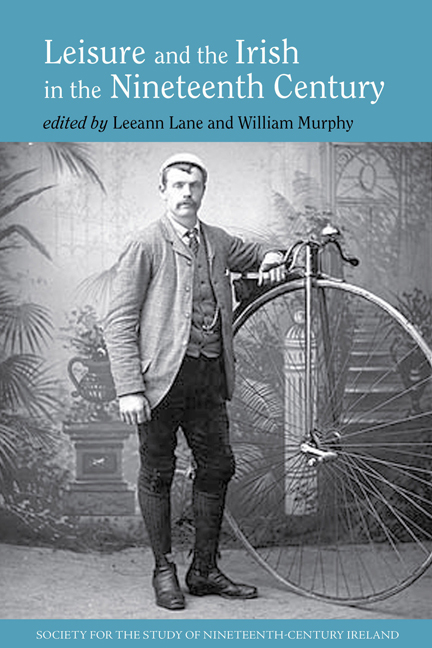Book contents
- Frontmatter
- Contents
- List of Figures and Tables
- Introduction
- Leisure and Associational Culture
- Leisure Spaces
- Leisure in Literature
- 6 Leisure in Charles Lever's Jack Hinton (1842) and the Continuities of Irish Fiction
- 7 The Fighting Irish: Faction Fighting as Leisure in the Writings of William Carleton
- 8 The Humours of Provincial Life: Theatre and Tourism in Matthew Archdeacon's Everard
- Leisure, Tourism and Travel
- Leisure and Female Élites
- Notes on Contributors
- Index
7 - The Fighting Irish: Faction Fighting as Leisure in the Writings of William Carleton
from Leisure in Literature
- Frontmatter
- Contents
- List of Figures and Tables
- Introduction
- Leisure and Associational Culture
- Leisure Spaces
- Leisure in Literature
- 6 Leisure in Charles Lever's Jack Hinton (1842) and the Continuities of Irish Fiction
- 7 The Fighting Irish: Faction Fighting as Leisure in the Writings of William Carleton
- 8 The Humours of Provincial Life: Theatre and Tourism in Matthew Archdeacon's Everard
- Leisure, Tourism and Travel
- Leisure and Female Élites
- Notes on Contributors
- Index
Summary
Manifestations of peasant violence frequent the writings of nineteenth-century Irish novelist William Carleton (1794–1869). His novels and short stories contain scenes of savagery and barbarity in which tithe proctors, policemen, process servers and, indeed, fellow peasants are viciously murdered by the Irish rural poor. In the short story, ‘Wildgoose Lodge’, Carleton depicted the events of the heinous attack on the home of Edward Lynch near Ardee in County Louth in 1816. Lynch and his family were burnt alive as a merciless band of Ribbonmen set their home ablaze. Similarly, in The tithe proctor: being a tale of tithe rebellion in Ireland (1848), Carleton described a Whiteboy attack on a tithe proctor's home inspired by the murder of the Bolands, an incident that occurred amidst tithe agitation in the south of the country at the beginning of the nineteenth century. Within the same novel Carleton related a version of the Carrickshock massacre which took place on 14 December 1831 in County Kilkenny. Seventeen people, including a process server and members of the constabulary, lost their lives as a result of the tithe-related affray. Through his depictions of these violent encounters Carleton worked to illustrate the volatile nature of, and the potential threat posed by, the Catholic, peasant populace for his predominately Protestant readership.
Fighting too, in two different forms, features within Carleton's writings on violence in pre-famine Ireland and it is this aspect of the author's work that will be the subject of this chapter. In two of the short stories included in the first series of Traits and stories of the Irish peasantry (1830–33) Carleton distinguished between two forms of fighting: ‘faction fighting’ (fighting between rival Catholic factions) and ‘party fighting’ (fighting involving parties of the two opposing religions that prevailed within Ireland during the period). Carleton endeavoured to differentiate between the two in his short stories ‘The battle of the factions’ and ‘The party fight and funeral’ and treated these two modes of fighting in different ways. In ‘The battle of the factions’, he described faction fighting as ‘recreation’, as ‘sport’, as ‘our national amusement’ and furthermore as the acumen of an Irish man's enjoyment. Conversely, in ‘The party fight and funeral’, Carleton defined party fighting by the ‘compressed vengeance’ and ‘hope of slaughter’ therein.
- Type
- Chapter
- Information
- Leisure and the Irish in the Nineteenth Century , pp. 130 - 146Publisher: Liverpool University PressPrint publication year: 2016



